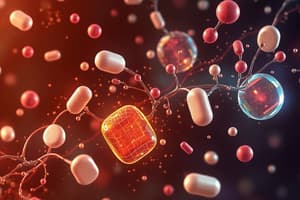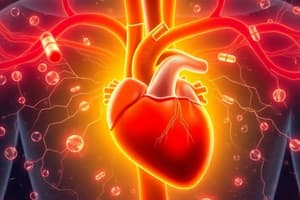Podcast
Questions and Answers
Which type of diuretic works by slowing down or turning off the salt pumps in nephron tubes farthest from capillaries?
Which type of diuretic works by slowing down or turning off the salt pumps in nephron tubes farthest from capillaries?
- Thiazide diuretics (correct)
- ACE Inhibitors
- Potassium-sparing diuretics
- Loop diuretics
What is a potential adverse effect of Thiazide diuretics?
What is a potential adverse effect of Thiazide diuretics?
- Photosensitivity
- Angioedema
- Hypokalemia (correct)
- Ototoxicity
Which of the following is NOT a side effect of Loop diuretics?
Which of the following is NOT a side effect of Loop diuretics?
- Ototoxicity
- Photosensitivity
- Hyperglycemia
- Hypokalemia (correct)
Which type of diuretic is most likely to cause hyperkalemia?
Which type of diuretic is most likely to cause hyperkalemia?
What is a common side effect of ACE inhibitors?
What is a common side effect of ACE inhibitors?
Which of the following medications is NOT a type of ACE inhibitor?
Which of the following medications is NOT a type of ACE inhibitor?
What is a potential adverse effect of Angiotensin II Receptor Blockers (ARBs)?
What is a potential adverse effect of Angiotensin II Receptor Blockers (ARBs)?
Which type of medication is most likely to cause Stevens-Johnson syndrome?
Which type of medication is most likely to cause Stevens-Johnson syndrome?
What is the main mechanism of action of Calcium Channel Blockers?
What is the main mechanism of action of Calcium Channel Blockers?
Which of the following medications is a Beta Blocker?
Which of the following medications is a Beta Blocker?
Which type of medication works by stimulating bone marrow to increase production of red blood cells and/or platelets?
Which type of medication works by stimulating bone marrow to increase production of red blood cells and/or platelets?
Which of these is NOT a known side effect of fibrates?
Which of these is NOT a known side effect of fibrates?
What is the mechanism of action for Warfarin?
What is the mechanism of action for Warfarin?
Which medication type can safely be used during pregnancy?
Which medication type can safely be used during pregnancy?
What is a potential adverse effect of Nicotinic Acid Agents?
What is a potential adverse effect of Nicotinic Acid Agents?
What is the primary effect of Aspirin on the body?
What is the primary effect of Aspirin on the body?
Which of the following medication types can increase the effectiveness of Warfarin?
Which of the following medication types can increase the effectiveness of Warfarin?
Which of the following is NOT a known side effect of Heparin?
Which of the following is NOT a known side effect of Heparin?
Which medication type works by directly and indirectly blocking thrombin activation?
Which medication type works by directly and indirectly blocking thrombin activation?
Which medication type is used to dissolve existing blood clots for conditions like heart attacks, strokes, and embolism?
Which medication type is used to dissolve existing blood clots for conditions like heart attacks, strokes, and embolism?
What is the primary effect of Absorption Inhibitors on cholesterol levels in the body?
What is the primary effect of Absorption Inhibitors on cholesterol levels in the body?
What is the primary role of Nicotinic Acid Agents (Niacin) in cholesterol management?
What is the primary role of Nicotinic Acid Agents (Niacin) in cholesterol management?
What is a potential side effect of taking Fibrates, specifically Gemfibrozil, in combination with Statins?
What is a potential side effect of taking Fibrates, specifically Gemfibrozil, in combination with Statins?
Which of these drugs is NOT an example of a Thrombin Inhibitor?
Which of these drugs is NOT an example of a Thrombin Inhibitor?
Which of the following is a common adverse effect associated with Warfarin?
Which of the following is a common adverse effect associated with Warfarin?
What is the primary mechanism of action of beta blockers, such as metoprolol?
What is the primary mechanism of action of beta blockers, such as metoprolol?
Which of the following medications is a direct vasodilator used for managing high blood pressure?
Which of the following medications is a direct vasodilator used for managing high blood pressure?
Which drug class is known to slow the heart rate by blocking the action of the vagus nerve?
Which drug class is known to slow the heart rate by blocking the action of the vagus nerve?
What is the mechanism of action of the cardiac glycoside, digoxin, in treating heart failure?
What is the mechanism of action of the cardiac glycoside, digoxin, in treating heart failure?
Which of the following medications is a positive inotrope, increasing heart contractility and cardiac output?
Which of the following medications is a positive inotrope, increasing heart contractility and cardiac output?
Which of the following is a common adverse effect associated with alpha blockers?
Which of the following is a common adverse effect associated with alpha blockers?
Which of the following drugs is a central-acting adrenergic agent used to treat hypertension?
Which of the following drugs is a central-acting adrenergic agent used to treat hypertension?
Which of the following is a common side effect of digoxin?
Which of the following is a common side effect of digoxin?
Which of the following drugs is a human B-type natriuretic peptide, primarily used for treating acute decompensated heart failure?
Which of the following drugs is a human B-type natriuretic peptide, primarily used for treating acute decompensated heart failure?
Which of the following is a common side effect associated with the use of human B-type natriuretic peptides?
Which of the following is a common side effect associated with the use of human B-type natriuretic peptides?
Which of the following drug classes is known to decrease the excitability of the heart by blocking sodium channels?
Which of the following drug classes is known to decrease the excitability of the heart by blocking sodium channels?
Which of the following medications is a potassium channel blocker?
Which of the following medications is a potassium channel blocker?
Which of the following is a potential life-threatening adverse effect associated with the use of potassium and magnesium?
Which of the following is a potential life-threatening adverse effect associated with the use of potassium and magnesium?
Which of the following agents is often used to treat bradycardia and some types of asystole?
Which of the following agents is often used to treat bradycardia and some types of asystole?
Which of the following drugs is NOT a beta blocker?
Which of the following drugs is NOT a beta blocker?
What is the primary action of bile acid sequestrants?
What is the primary action of bile acid sequestrants?
What should patients do to minimize gastrointestinal discomfort when taking bile acid sequestrants?
What should patients do to minimize gastrointestinal discomfort when taking bile acid sequestrants?
What adverse effect is associated with the use of bile acid sequestrants?
What adverse effect is associated with the use of bile acid sequestrants?
What effect do bile acid sequestrants have on anticoagulants like warfarin?
What effect do bile acid sequestrants have on anticoagulants like warfarin?
Which of the following is an example of a cholesterol-reducing agent?
Which of the following is an example of a cholesterol-reducing agent?
What mechanism do bile acid sequestrants employ to lower blood lipid levels?
What mechanism do bile acid sequestrants employ to lower blood lipid levels?
What is a potential result of prolonged use of bile acid sequestrants?
What is a potential result of prolonged use of bile acid sequestrants?
Which of these side effects is NOT commonly associated with bile acid sequestrants?
Which of these side effects is NOT commonly associated with bile acid sequestrants?
How do bile acid sequestrants affect the intestines?
How do bile acid sequestrants affect the intestines?
What is the main benefit of integrating bile acid sequestrants in treatment regimens?
What is the main benefit of integrating bile acid sequestrants in treatment regimens?
What is a primary use of Class 4 Calcium Channel Blockers?
What is a primary use of Class 4 Calcium Channel Blockers?
Which effect is associated with adenosine when administered IV?
Which effect is associated with adenosine when administered IV?
What adverse effect is commonly associated with magnesium sulfate?
What adverse effect is commonly associated with magnesium sulfate?
What mechanism does magnesium sulfate utilize to prevent torsades de pointes?
What mechanism does magnesium sulfate utilize to prevent torsades de pointes?
Which statement best describes adenocard's mechanism of action?
Which statement best describes adenocard's mechanism of action?
What is a common side effect of statin medications?
What is a common side effect of statin medications?
Which drug class is most commonly prescribed for managing hyperlipidemia?
Which drug class is most commonly prescribed for managing hyperlipidemia?
What should be avoided when administering adenosine?
What should be avoided when administering adenosine?
Which drug is an example of a Class 4 antiarrhythmic agent?
Which drug is an example of a Class 4 antiarrhythmic agent?
For what condition is adenosine MOST commonly used?
For what condition is adenosine MOST commonly used?
What is the main effect of Class 4 Calcium Channel Blockers on heart function?
What is the main effect of Class 4 Calcium Channel Blockers on heart function?
What is a potential consequence of high doses of magnesium in the body?
What is a potential consequence of high doses of magnesium in the body?
In treating atrial fibrillation, what is the goal of therapy?
In treating atrial fibrillation, what is the goal of therapy?
Which side effect is NOT commonly reported for statins?
Which side effect is NOT commonly reported for statins?
Flashcards
Loop Diuretics
Loop Diuretics
Powerful diuretics that inhibit Na+ pumps in the Loop of Henle.
Furosemide
Furosemide
A loop diuretic causing photosensitivity and ototoxicity.
Thiazide Diuretics
Thiazide Diuretics
Diuretics that work on nephron tubes, reducing blood volume and BP.
Chlorothiazide
Chlorothiazide
Signup and view all the flashcards
Potassium-sparing Diuretics
Potassium-sparing Diuretics
Signup and view all the flashcards
Spironolactone
Spironolactone
Signup and view all the flashcards
ACE Inhibitors
ACE Inhibitors
Signup and view all the flashcards
Lisinopril
Lisinopril
Signup and view all the flashcards
Angiotensin II Receptor Blockers (ARBs)
Angiotensin II Receptor Blockers (ARBs)
Signup and view all the flashcards
Calcium Channel Blockers
Calcium Channel Blockers
Signup and view all the flashcards
Bile Acid Sequestrants
Bile Acid Sequestrants
Signup and view all the flashcards
Lower Blood Lipid Levels
Lower Blood Lipid Levels
Signup and view all the flashcards
Mechanism of Action
Mechanism of Action
Signup and view all the flashcards
Cholesterol Binding
Cholesterol Binding
Signup and view all the flashcards
Examples of Bile Acid Sequestrants
Examples of Bile Acid Sequestrants
Signup and view all the flashcards
Patient Instructions
Patient Instructions
Signup and view all the flashcards
Gastrointestinal Side Effects
Gastrointestinal Side Effects
Signup and view all the flashcards
Vitamin K Absorption
Vitamin K Absorption
Signup and view all the flashcards
Warfarin Interaction
Warfarin Interaction
Signup and view all the flashcards
Cholesterol Reduction
Cholesterol Reduction
Signup and view all the flashcards
Class 4 Calcium Channel Blockers
Class 4 Calcium Channel Blockers
Signup and view all the flashcards
Diltiazem
Diltiazem
Signup and view all the flashcards
Verapamil
Verapamil
Signup and view all the flashcards
Adenosine
Adenosine
Signup and view all the flashcards
Mechanism of Adenosine
Mechanism of Adenosine
Signup and view all the flashcards
Magnesium Sulfate
Magnesium Sulfate
Signup and view all the flashcards
Calcium Channel Blockers Effect
Calcium Channel Blockers Effect
Signup and view all the flashcards
Ventricular Tachycardia
Ventricular Tachycardia
Signup and view all the flashcards
Side Effects of Adenosine
Side Effects of Adenosine
Signup and view all the flashcards
Statins
Statins
Signup and view all the flashcards
Common Statins
Common Statins
Signup and view all the flashcards
Statins and Muscle Pain
Statins and Muscle Pain
Signup and view all the flashcards
Torsades de Pointes
Torsades de Pointes
Signup and view all the flashcards
IV Magnesium Use
IV Magnesium Use
Signup and view all the flashcards
Decreased Heart Rate
Decreased Heart Rate
Signup and view all the flashcards
Zetia
Zetia
Signup and view all the flashcards
Fibrates
Fibrates
Signup and view all the flashcards
Niacin
Niacin
Signup and view all the flashcards
Thrombin Inhibitors
Thrombin Inhibitors
Signup and view all the flashcards
Warfarin
Warfarin
Signup and view all the flashcards
Aspirin
Aspirin
Signup and view all the flashcards
Thrombolytics
Thrombolytics
Signup and view all the flashcards
Colony-Stimulating Factors
Colony-Stimulating Factors
Signup and view all the flashcards
HDL Cholesterol
HDL Cholesterol
Signup and view all the flashcards
LDL Cholesterol
LDL Cholesterol
Signup and view all the flashcards
Triglycerides
Triglycerides
Signup and view all the flashcards
Creatinine
Creatinine
Signup and view all the flashcards
Side Effects of Statins
Side Effects of Statins
Signup and view all the flashcards
Heparin
Heparin
Signup and view all the flashcards
Alpha Blockers
Alpha Blockers
Signup and view all the flashcards
Beta Blockers
Beta Blockers
Signup and view all the flashcards
Digoxin
Digoxin
Signup and view all the flashcards
Central Acting Adrenergic Agents
Central Acting Adrenergic Agents
Signup and view all the flashcards
Direct Vasodilators
Direct Vasodilators
Signup and view all the flashcards
Positive Inotropes
Positive Inotropes
Signup and view all the flashcards
Class IA Sodium Channel Blockers
Class IA Sodium Channel Blockers
Signup and view all the flashcards
Class IB Sodium Channel Blockers
Class IB Sodium Channel Blockers
Signup and view all the flashcards
Class IC Sodium Channel Blockers
Class IC Sodium Channel Blockers
Signup and view all the flashcards
Class III Potassium Channel Blockers
Class III Potassium Channel Blockers
Signup and view all the flashcards
Nesiritide
Nesiritide
Signup and view all the flashcards
Atropine
Atropine
Signup and view all the flashcards
Hydralazine
Hydralazine
Signup and view all the flashcards
Lidocaine
Lidocaine
Signup and view all the flashcards
Clonidine
Clonidine
Signup and view all the flashcards
Study Notes
Diuretics
- Loop diuretics (e.g., furosemide) are the most powerful, inhibiting sodium pumps in the loop of Henle, causing increased loss of sodium, potassium, calcium, and water.
- Thiazide diuretics (e.g., chlorothiazide, metolazone) inhibit sodium pumps in the distal convoluted tubule, reducing blood volume and blood pressure.
- Potassium-sparing diuretics (e.g., spironolactone, amiloride) reduce potassium loss, maintaining levels within a healthy range.
ACE Inhibitors
- ACE inhibitors (e.g., lisinopril, enalapril) block the production of angiotensin II, a hormone that constricts blood vessels, relaxing blood vessels and decreasing water.
Angiotensin II Receptor Blockers (ARBs)
- ARBs (e.g., valsartan, losartan) block the effects of angiotensin II, reducing vasoconstriction and sodium/water retention.
Calcium Channel Blockers
- Calcium channel blockers (e.g., amlodipine, verapamil) block calcium entering muscle cells, reducing the strength of heart contractions and dilating arteries.
- Class 2 Beta Blockers (e.g., metoprolol, atenolol, acebutolol), block the effects of epinephrine, reducing heart rate and force of contraction.
Alpha Blockers
- Alpha blockers (e.g., carvedilol, labetalol) block norepinephrine effects, leading to artery relaxation and dilation.
Alpha-Beta Blockers
- Alpha-beta blockers (e.g., carvedilol, labetalol) relax blood vessels and slow heart rate and the force of contraction.
Central-Acting Adrenergic Agents
- Central-acting adrenergic agents (e.g., clonidine, methyldopa) stimulate CNS receptors to constrict blood vessel flow, thereby decreasing it.
Direct Vasodilators
- Direct vasodilators (e.g., hydralazine) dilate peripheral arteries, lowering blood pressure.
Cardiac Glycosides (Digoxin)
- Cardiac glycosides (e.g., digoxin) slow heart rate, strengthen heartbeat, and improve cardiac output.
Human B-type Natriuretic Peptides
- Human B-type Natriuretic Peptides (e.g., nesiritide) eliminate excessive sodium and water, decreasing blood pressure.
- Positive inotropes (e.g., dobutamine, dopamine) increase heart contraction and cardiac output.
Potassium & Magnesium
- Potassium and magnesium are essential for a healthy nervous system, and regulate heart rhythm.
- Potassium sparing diuretics can maintain potassium levels.
Other Drugs
- Colony-Stimulating Agents stimulate bone marrow to increase the production of red blood cells or platelets, improving clotting ability.
- Thrombolytics dissolve existing clots for heart attacks, strokes, or emboli.
- Thrombin inhibitors stop the action of thrombin, preventing clot formation.
- Clotting factor synthesis inhibitors (e.g., warfarin) interfere with vitamin K synthesis, decreasing clot formation.
- Antiplatelet drugs (e.g., aspirin) block platelet aggregation, preventing clot formation.
Studying That Suits You
Use AI to generate personalized quizzes and flashcards to suit your learning preferences.




